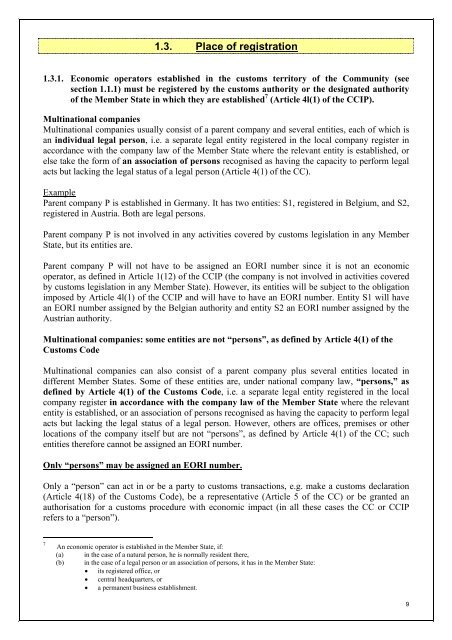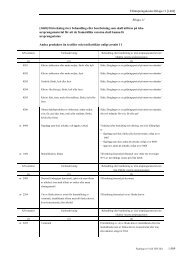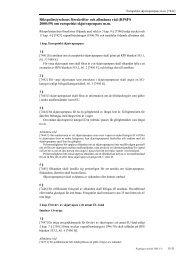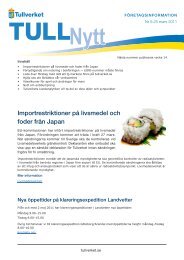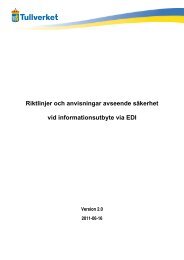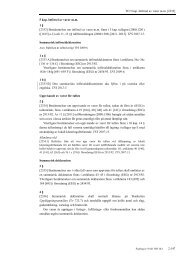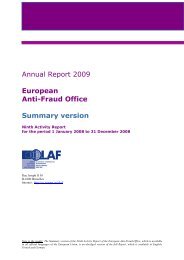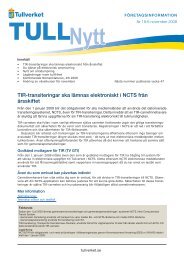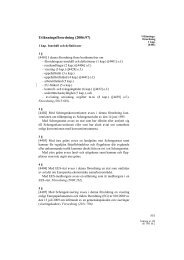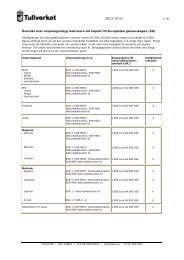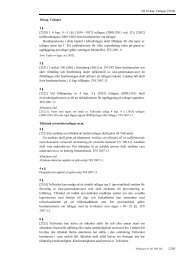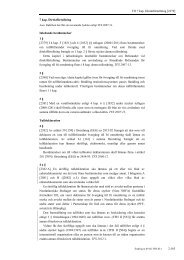EORI Guidelines - European Commission - Europa
EORI Guidelines - European Commission - Europa
EORI Guidelines - European Commission - Europa
You also want an ePaper? Increase the reach of your titles
YUMPU automatically turns print PDFs into web optimized ePapers that Google loves.
1.3. Place of registration1.3.1. Economic operators established in the customs territory of the Community (seesection 1.1.1) must be registered by the customs authority or the designated authorityof the Member State in which they are established 7 (Article 4l(1) of the CCIP).Multinational companiesMultinational companies usually consist of a parent company and several entities, each of which isan individual legal person, i.e. a separate legal entity registered in the local company register inaccordance with the company law of the Member State where the relevant entity is established, orelse take the form of an association of persons recognised as having the capacity to perform legalacts but lacking the legal status of a legal person (Article 4(1) of the CC).ExampleParent company P is established in Germany. It has two entities: S1, registered in Belgium, and S2,registered in Austria. Both are legal persons.Parent company P is not involved in any activities covered by customs legislation in any MemberState, but its entities are.Parent company P will not have to be assigned an <strong>EORI</strong> number since it is not an economicoperator, as defined in Article 1(12) of the CCIP (the company is not involved in activities coveredby customs legislation in any Member State). However, its entities will be subject to the obligationimposed by Article 4l(1) of the CCIP and will have to have an <strong>EORI</strong> number. Entity S1 will havean <strong>EORI</strong> number assigned by the Belgian authority and entity S2 an <strong>EORI</strong> number assigned by theAustrian authority.Multinational companies: some entities are not “persons”, as defined by Article 4(1) of theCustoms CodeMultinational companies can also consist of a parent company plus several entities located indifferent Member States. Some of these entities are, under national company law, “persons,” asdefined by Article 4(1) of the Customs Code, i.e. a separate legal entity registered in the localcompany register in accordance with the company law of the Member State where the relevantentity is established, or an association of persons recognised as having the capacity to perform legalacts but lacking the legal status of a legal person. However, others are offices, premises or otherlocations of the company itself but are not “persons”, as defined by Article 4(1) of the CC; suchentities therefore cannot be assigned an <strong>EORI</strong> number.Only “persons” may be assigned an <strong>EORI</strong> number.Only a “person” can act in or be a party to customs transactions, e.g. make a customs declaration(Article 4(18) of the Customs Code), be a representative (Article 5 of the CC) or be granted anauthorisation for a customs procedure with economic impact (in all these cases the CC or CCIPrefers to a “person”).7An economic operator is established in the Member State, if:(a) in the case of a natural person, he is normally resident there,(b) in the case of a legal person or an association of persons, it has in the Member State:• its registered office, or• central headquarters, or• a permanent business establishment.9


